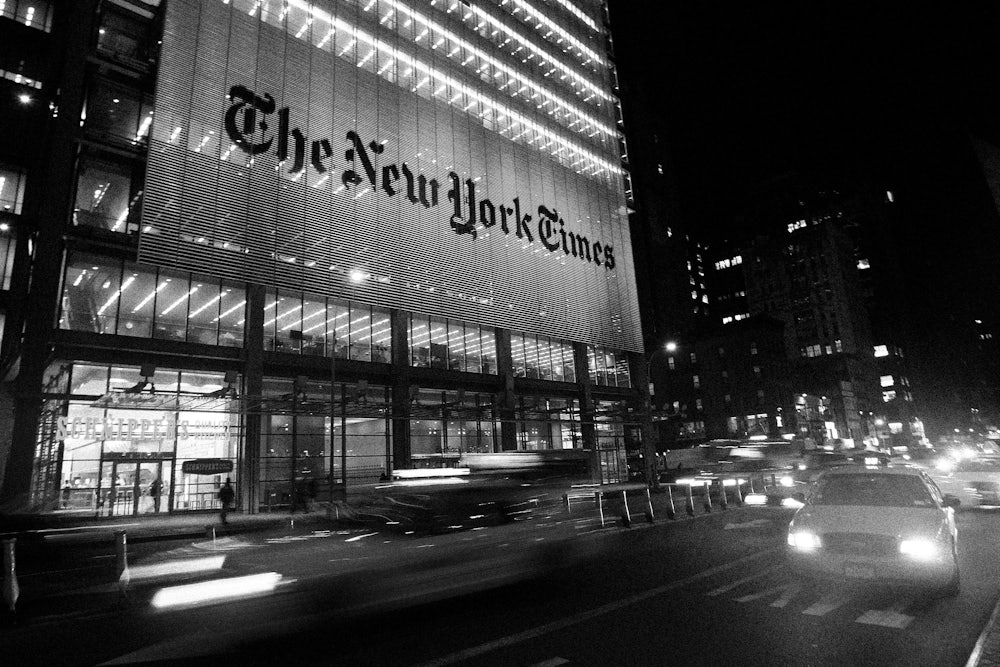In 2020, the media got bigger. The New York Times continued its hegemonic expansion, announcing that it had topped five million subscribers in March, six million in June, and seven million in November. It has used its clout to hire whomever it wants, and digital publications, once seen as an existential threat, are now a hunting ground. A wave of consolidation swept through those digital publications, culminating in BuzzFeed’s acquisition of HuffPost last month. Unprecedented election interest swelled the coffers of cable networks, which practically minted their own money, a remarkable development given the rise of cord-cutting.
Another way of thinking about this, however, is that the media shrank. BuzzFeed’s acquisition of HuffPost capped a frenetic year-and-a-half period of digital consolidation—Vox acquired New York last September; Vice bought Refinery29 a month after that. Covid-19-related revenue loss led to the industry shedding tens of thousands of jobs; if 2019 was a bleak year for layoffs, then 2020 was much, much worse.
By hoovering up nearly all of the ad dollars online, Facebook and Google have made it all but impossible to run a modestly sized, modestly profitable digital newsroom. The internet once abounded with punchy, scrappy, unpredictable outlets like Gawker and The Awl, but the fun internet is now nearly extinct, absorbed by larger entities. Local newspapers, moreover, have been decimated by declining ad money and circulation, leaving what The Washington Post’s Margaret Sullivan has termed “news deserts” spreading across the country.
The decline in trust of the news media has coincided with a deep concentration of the news media. Without trustworthy news sources, conspiracy theories are spreading like wildfire, particularly on social platforms like Facebook and Reddit. Corruption, particularly at the neglected state and local levels, is on the rise. Reversing media consolidation—and rebuilding local news and a vibrant, diverse internet—is crucial to rebuilding American democracy. It’s clear that this effort cannot happen on its own—the government must step in.
This is not a new problem. Media has consolidated in just the same way that the rest of the American economy has. Although the Federal Communications Commission was created in 1934 in part to prevent media consolidation, it has, over the last four decades, accelerated it. Writing in a roundtable focused on media consolidation, in The American Prospect, in 2005, Jim Fallows lamented that the problems of concentration were already “too advanced, in my view, to be corrected or cured in the foreseeable future.”
There was some hope, then, that the blogosphere would save the day. Writing in the same roundtable, Arianna Huffington made the case that “the blogosphere has become the most vital and important news source in our country.” Big media was reeling from the Iraq War. It was behind the times technologically and couldn’t keep up with upstart blogs, like what was then known as the Huffington Post. The internet was not just a counterbalance, it was a revolution. Fifteen years later, new media looks more and more like old media. The upstarts are huddling together, in a desperate attempt to fight Google and Facebook’s dominance.
Breaking Facebook and Google’s ad duopoly is necessary to ensure that journalism can survive in the internet era. About 70 percent of all ad dollars spent in the United States went to the two companies in 2019, thanks to a years-long effort to cut rates and cut out competitors.
Australia, of all places, has found a solution. After months of jockeying, the country finalized plans in December for Facebook and Google to pay publishers for content that appears on their platforms. “Our legislation will help ensure that the rules of the digital world mirror the rules of the physical world … and ultimately sustain our media landscape,” Treasurer Josh Frydenburg told reporters. Google has also been ordered by a French appeals court to negotiate with publishers to pay for the snippets of content that appear in the company’s search function. Although these moves don’t shake up the landscape significantly—Google and Facebook’s hold on digital advertising remains—publishers would receive additional compensation, providing a crucial lifeline.
A similar move in the U.S., perhaps as part of larger antitrust action, could help both digital upstarts and local news outlets. The largest players—The New York Times and The Washington Post—would still hold onto their perches; cable news would be virtually unaffected. But there would be more alternatives online. The internet could regain some of its spontaneity and sense of adventure. Local newsrooms, devastated by private equity and consolidation, would gain an important source of revenue.
It wouldn’t be enough, however. The newest economic saviors for journalism—podcasting and newsletters—have not yet shown they have much to offer local news, in particular, though City Cast and Axios are hoping to change that next year. More support is needed from the federal government, as well as from state and local governments. News deserts mean that people aren’t learning about important stories that are happening around them—and fake news is flourishing without trusted, local sources to debunk it. (Indeed, more robust local news sources would help push back against President Trump’s claims that the election was rigged against him.)
There have been some promising developments in this area. New Jersey has committed $5 million to fostering local news outlets over the last two years. Report for America, like Teach for America but for journalism, has brought hundreds of young journalists into small newsrooms. But it’s clear that much greater investment is needed to ensure that local outlets don’t go extinct over the next few years.
What’s apparent, as 2020 comes to a close, is that no business model can foster the diverse, noisy, and pugnacious media that American democracy needs to survive. The larger economic climate demands increased concentration, and media organizations have responded by getting bigger and more remote from the concerns of many citizens. Policy is the only way to reverse this disturbing trend.
